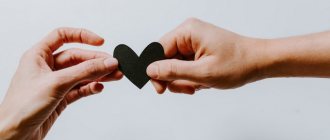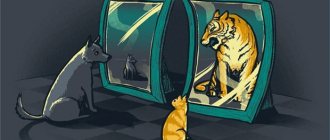Someone famous said that knowing yourself is the greatest wisdom that can exist in the life of every person. Once he understands, gets to know his purpose, goals, moral qualities, moral component, moments with which he can or cannot put up with, his potential will immediately be revealed. The soul will be “freed” from excess burden and will be associated with the concept “I am the truth.”
The process of self-discovery is necessary at any age, and one cannot assume that older people do not need it. On the contrary, as we live through the years, we become “overgrown” with a thick layer of negativity and routine. It is necessary to throw off unnecessary ballast and reveal the true “I”. Only by learning from experienced psychologists and sages about how to know yourself can you easily and without fear approach the end of your life’s journey, preparing to meet the Almighty.
What does self-knowledge mean?
Self-knowledge is understanding oneself, studying one’s psychological, biological, social and spiritual characteristics.
Self-knowledge begins in infancy, when the child begins to recognize himself as an individual person, and continues throughout our lives.
In simple terms, a person’s knowledge of himself is the study of:
- your strengths and weaknesses;
- fears;
- desires;
- interests;
- attachments;
- inclinations;
- hopes;
- ability to communicate;
- attitudes towards life and people;
- values;
- attitude towards criticism;
- life satisfaction, etc.
Morning Pages
Do you trust your feelings? Not all people have time to understand their soul and understand what it really needs. Try to stop constantly running. How to do it? Start writing your morning pages. Get up 30 minutes earlier than you are used to and sit down at the table. After that, you need to write three pages of text. What will it be? Pour out on paper all the thoughts that haunt you. Don't judge your thoughts, just write them down. Think of this activity as your morning meditation. Through daily writing, you can experience a state of inner peace. Why? All your complaints, regrets and all the negativity that lives in your soul will be poured onto paper. By clearing yourself of all this, you will leave the table with a clean and clear head.
Why does this practice work? A person who writes something down on paper automatically throws out of his head the information that his hand wrote. The brain understands that information is now stored on paper, and it is not scary to replace it with something else. Remember, practice will only work if it is done daily. You need to write pages immediately after waking up. Get a notebook and fill out three pages every morning. You can write more, but you cannot write less.
Why is it so difficult to know yourself?
There are several reasons:
- Lack of time. We live at a frantic pace, rack our brains over how to combine work and family, chase earnings, experience stress and have trouble sleeping. In this way of life, the idea of self-knowledge seems sheer nonsense. In our daily time pressure, we sometimes have no time to sit in silence and drink a cup of tea. What kind of knowledge can we talk about there? By the way, I recommend reading our article on how to deal with stress, and also familiarize yourself with a selection of books to improve the quality of your sleep.
- Focus on the external. We are more in need of external success, promotion, status, influence, material goods and underestimate the importance of satisfying our internal hunger. However, achieving success is very closely related to self-analysis. If you don't pay attention to what's inside, you can get devastated even when you reach decent heights.
- Reluctance to face the truth. We all sometimes commit unpleasant acts, utter hurtful words, and behave unworthily. If you start delving into your personality, you can find a lot of negative things there. Who likes to learn this about themselves? It’s much easier not to notice and not interfere with the comfortable perception of your loved one. Otherwise, we will have to change something and destroy the world to which we are so accustomed.
- Lack of awareness of actions. We do many things in our lives unconsciously. Since it is difficult for the brain to concentrate on all the actions in each moment, all the feelings and emotions, it takes the path of least resistance and turns on autopilot.
- Identifying yourself with your thoughts. Possessing pronounced critical thinking, a person forgets that he is a combination of mind, feelings and body. With such a limited way of exploring oneself, it is extremely difficult to achieve self-knowledge.
- Guide only by feelings. This assumes the opposite situation to the previous point, when a person follows momentary feelings, not taking into account the fact that the assessment of reality can be distorted due to various factors.
The power of intuition
What is the main task of intuition?
- Intuition helps not to forget, but to reveal both yourself and your Self.
- Helps you find your true path of purpose and self-development in this life.
Famous and successful people understand and use the power of intuition. Following their intuitive feelings, they fully realize themselves and their talents. For example, intuition played an important role in the life of Steve Jobs. He relied completely on his intuitive feelings and considered them a powerful tool in realizing himself and his goals
Below are two of Steve Jobs' many quotes about intuition and its role in his life: - It is very important to have the courage to follow your heart and intuition. They somehow already know what you really want to do
Everything else is secondary. — In my opinion, intuition is a very powerful thing. More powerful than intelligence. Intuition has had a huge impact on my work.
Friends, develop your intuitive sense. By following your Heart, you choose the right path. Intuition will become your Guide on the path of self-knowledge and self-development!
What does a lack of self-knowledge lead to?
According to British author and best-selling English-language novelist Alain De Botton, “a lack of self-knowledge leaves us open to chance and misguided ambition.”
More than 100 cool lessons, tests and exercises for brain development
Start developing
What else does a lack of self-knowledge entail:
- Low self-esteem and anxiety. If a person does not have a clear idea of what he is, what advantages he has and what kind of potential lies within him, when assessing himself he will be guided by the opinions of others, and as we know, they are not always flattering.
- Difficult relationships with others. We are talking about both personal life, relationships with loved ones, and social connections with colleagues, friends, and outsiders. A person who does not know what he loves and what he wants will invariably enter into toxic relationships, endure other people's complaints, rudeness, neglect and other negativity.
- Least favorite job. When choosing a profession, we are often guided by the wishes of our parents or social recognition. A person who knows and values himself and his time will strive to find something he enjoys that promotes development and success. You can read how to find your purpose in our separate publication.
- Throwing money down the drain. In this case, finances are wasted on things that do not bring true pleasure, but are purchased for the sake of fashion. And so every time. Moreover, not only money is spent in this way, but also time.
Knowing yourself - the first steps
It was absolutely clear that a person is not only a physical body, because the joys and pleasures of the body gave me so little and did not satiate my soul at all. In fact, my own body was much more often a burden to me. He had to be fed and bathed. Keep fit and dressed. Take care of him constantly. It was incredibly annoying at times.
I read somewhere that “the body is a prison of the spirit,” and I completely agreed. I knew for sure that a person was born for great achievements, and not at all to provide his physical body with bliss and all kinds of comfort.
The process of self-discovery assumed that I would finally find this real tool with the help of which a picture of the world around me and my place in it would come together. In the end it happened, but first the seven circles of hell awaited me.
What does self-knowledge give?
What does a person look like who is not afraid to get to know himself and look at his personality soberly and honestly:
- He does not shift responsibility for his failures in relationships and career onto other people, but tries to understand the situation and solve it in the most environmentally friendly way.
- He has healthy self-esteem, which allows him not to become discouraged when faced with criticism, competition, loss, etc.
- He becomes more aware, uses autopilot less and begins to notice the smallest changes.
- He stops blaming himself and others for his bad mood.
- He treats money adequately: he does not waste it, but directs it to what is really important to him.
- He gets used to hearing and listening to himself, his body, and resting when it is truly necessary. Such a person treats himself with care, love and understanding.
- Sensitivity to the world and the people around you awakens, mutual understanding grows.
- He is able to make positive changes in his life because he understands how people hold themselves back and for what reasons.
- When making a choice, he relies only on himself.
- A person understands his uniqueness and the possession of an exceptional set of qualities necessary for development.
- Becomes more harmonious and happy.
I am everything. Down and Out trouble started
I can open my palm and absorb the trembling of heaven into it, I can resurrect fire and comprehend the singing forest...*
When I was young, I was absolutely sure that I could do anything. Absolutely everything, you know? I can change the world. Yes Yes exactly. There was a joyful anticipation: the world around either hung at the tips of his fingers, which he only had to click, and... Or maybe he was itching on the tip of his tongue in search of that very cherished Word?..
It seemed that any minute now I would find the very thing that was missing. I will be able to understand how to use this special gift. Just know yourself, your special device - and everything will work out!
Those around me openly pointed their fingers at my temple and made unflattering comments about my self-esteem. Society assumed that a person should live like everyone else and pull this burden until his deathbed. But I didn’t care too much about the opinions of “stupid ordinary people.” By that time it was already clear that we were unlikely to find a common language.
Ways to know yourself
Let's move from theory to practice and find out with what methods and tools you can dive deeper into your personality, get to know yourself better and find harmony.
1. Slowdown
It is logical that with our rhythm of life it is extremely difficult to engage in self-knowledge. Start by slowing down and taking time for yourself. There are 24 hours in a day and, believe me, if you use them wisely, you can find time for anything.
I recommend reading about time management techniques that will help you manage your life more productively.
The right questions
Two main questions that are important to regularly ask yourself:
- What's going on in my life right now?
- How okay am I with this?
It is better to record the answers that pop up in your head on paper point by point. For a more comprehensive understanding, it is better to take several areas of life at once and go through each of them. Ask yourself: “What is happening now with my personal life, professional fulfillment, health, finances, creative self-expression?”
If distortions that create discomfort have been identified in some areas, you should move to the next stage and find out the reasons, possible methods of correction, or even the validity of personal claims to this or that area of life.
What other questions will help you get to know yourself better:
- How am I feeling at the moment?
- Who am I? Who do I consider myself to be, what place do I occupy in society, at work, in the family?
- What is my life goal and values, where am I going?
- Do I have any grudges against my parents and if so, what is the reason?
- What kind of people do I like and dislike?
- What actions and achievements am I proud of?
- In what situations did I act incorrectly and could this have been avoided?
- What things in life do I consider the most important? How much time do I devote to them?
- What purchases do I often make based on advertising or trends that end up not making me happy?
- What addictions are dragging me down? Am I ready to correct them?
- What negative traits of my character would I not want to demonstrate to people dear to me and those around me?
- What's making me jealous lately?
- What prevents me from making decisions and making my life better?
Even more questions that reveal your personality can be found in self-discovery tests.
Self-observation and self-analysis
Simply observing your behavior, internal sensations, emotions, reactions to certain words and events will help you get to know yourself. Such observation must certainly be followed by self-analysis, which will help confirm or refute your own conclusions, find out the reasons and think about improving the situation.
Let me give you an example. Observing himself, a person realizes that he is overly shy. Through introspection, it is possible to confirm this fact: it can be difficult to get comfortable in the company of strangers, it is difficult to express your point of view, there is a desire to remain silent, sit out, when you try to say something, your throat dries up, your face turns red.
After this, an assessment is made: whether attacks of embarrassment always occur or only in specific situations and under certain conditions. Next, the person looks for ways to cope with his shyness, performs various techniques, practices, signs up for trainings, etc.
By the way, I advise you to read our article on how to get rid of complexes.
Mindfulness
Control over one's actions, thoughts and feelings makes a person truly the master of his destiny.
The Indian philosopher Osho in his book “Mindfulness” described the practice of being in the “here and now” state. He believes that the most important skill to learn is observation. Here are the recommendations he gives:
- Watch every action you take, every thought that passes through your mind, every desire that comes over you.
- Watch what and how you say, what gestures you use, how you walk and even brush your teeth and take a bath.
- Do not eat mechanically, stuffing your mouth with food, chew with observation, with feeling. Otherwise, even the most delicious food will seem bland and will not bring satisfaction.
- Watch. This way you will understand how much you have missed so far.
Psychological work
It consists of reading books on psychology and socionics, passing psychological tests, identifying one’s own psychotype, chronotype, etc.
There are many classifications of human personality types: according to Holland, according to Jung, according to temperament, perception, etc.
Here, for example, is what the socionic division of personality types looks like (see picture below).
Application of various techniques
I will give an example of the simplest and safest technique of self-knowledge, which is based on art therapy and psychological work with subpersonalities.
The practice takes place in two stages:
- Thoughtful. Close your eyes and imagine yourself in the future. The term can be any – 1 month, 5–10 years. Pay attention to how you look, what you have, what you don’t have, whether you are happy, how you feel, what you do, who you live with, who you are close to, etc.
- Expression in a drawing. Now transfer the presented image onto paper. Don't chase technique. The main thing is to be creative, choose colors and shapes.
The point of this technique is to correlate the image that was created in the imagination with what is now in reality. This will give you the opportunity to understand what is in the future and what is missing at the moment, what you would like to get or, conversely, what to get rid of.
If the future seems vague and uncomfortable, it is worth thinking about the psychological blocks that, even at the level of imagination, do not allow you to see yourself as joyful and harmonious. In this case, the block can also be represented in the form of a drawing, thinking about what color, size, shape it might have, what it looks like, what it serves, etc.
You might be interested in reading about how to get out of depression.
Esoteric systems
Anyone who does not consider himself an inveterate skeptic can use various esoteric tools that allow him to look deeper into his inner world. These include:
- astrology;
- human design (Human Design);
- tarot cards;
- numerology;
- meditation;
- yoga;
- qigong;
- space energy;
- Reiki energy;
- channeling.
There are actually a lot of such techniques. At the same time, it is not at all necessary to rush to extremes and begin to comprehend everything at once. There may be something for everyone. For example, I have been doing yoga with a trainer for several years, I like meditation, and I am also interested in numerology, Tarot and Human Design. Perhaps you too can reveal new facets of your personality with the help of one of these tools.
I recommend taking spiritual development courses. You will get to know yourself better, unlock your potential and be able to achieve inner harmony.
Stage four - Jug
On the path to self-knowledge in esotericism, you must get rid of negative thoughts . This can be achieved through a meditation called "Jug".
Stand comfortably, feet shoulder-width apart, palms at stomach level. The fingers should touch each other. Start breathing and monitor your breathing. When you achieve relaxation and inner peace, imagine yourself as a jug. Imagine how water fills your body, overflows over the edges of the jug (head) and flows down your body, going into the ground. All bad thoughts, problems, worries pour out of you along with the water. You are cleared of all this. Water washes away all the dirt from the soul and thoughts and goes into the ground.
When you finish your meditation, take two deep breaths in and out. Sharply clench and unclench your fists. Open your eyes.











